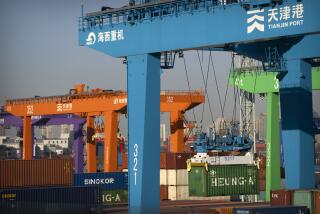The leading non-communist industrial economies, which seemed...
- Share via
PARIS — The leading non-communist industrial economies, which seemed on the brink of a recession a year ago, are now at their most buoyant since the early 1970s, the Organization for Economic Cooperation and Development reported Tuesday.
A six-month report by the influential Paris-based economic research organization said industrial output in its 24 member nations had grown at an annual rate of more than 4% since mid-1987.
The brisk expansion has been widespread and investment in industry has grown especially quickly, it said.
“This unusually favorable conjuncture provides national authorities with the opportunity to push ahead with policies which would underpin and sustain the improvement in the economic climate,” the OECD said.
But the report added that unemployment would generally remain high while global inflation is edging up, running about 4%. However, it said inflation may be dampened by some slowing of the expansion, which the group predicts.
Slower in the ‘90s
The OECD also said uncertainty persists about the correction of the three largest economies’ trade imbalances, as the United States is still running huge deficits while Japan and West Germany are dramatically in surplus.
The OECD raised its growth projections for all major industrial economies from its projections six months ago. It forecast they would expand by 4% this year and 3.25% in 1989. In June, the group had predicted growth of only 3% and 2.5%.
For 1990, the agency’s first estimates are that the global expansion will slow to 2.75%.
“What worries us is the possibility that growth could be faster . . . (and) inflation could be more of a threat,” David Henderson, head of the OECD’s economics and statistics department, told a news conference in Paris on the outlook.
The outlook differs sharply from a year ago when, two months after the worst stock market crash since 1929, the OECD said that “prolonged or acute financial market turmoil could even carry the risk of a recession accompanied by higher interest rates.”
The OECD now gives high marks to governments for cooperating to improve business confidence. The strong gain in industrial investment is “an indication that ‘animal spirits’ have been raised in most OECD countries.”
But it added: “The dollar nevertheless remains vulnerable to pressures in exchange markets and a sharp cumulative decline . . . would threaten the improved economic situation.”
Creeping Inflation
The OECD also said persistent global trading imbalances “could damage market confidence and stability--especially if, as is possible, the trend in monthly trade figures becomes less favorable.”
On inflation, it said risks were particularly great in North America, Sweden and some other smaller European countries, where both labor and product markets remain tight.
In Britain and some other European nations the inflation risk was not so much that of a spectacular resurgence “but rather of a more insidious development.”
The report spoke of “forces getting a grip on the system which will make for a slow but cumulative acceleration of prices similar to the ‘creeping inflation’ of the late 1960s.”
More to Read
Inside the business of entertainment
The Wide Shot brings you news, analysis and insights on everything from streaming wars to production — and what it all means for the future.
You may occasionally receive promotional content from the Los Angeles Times.









